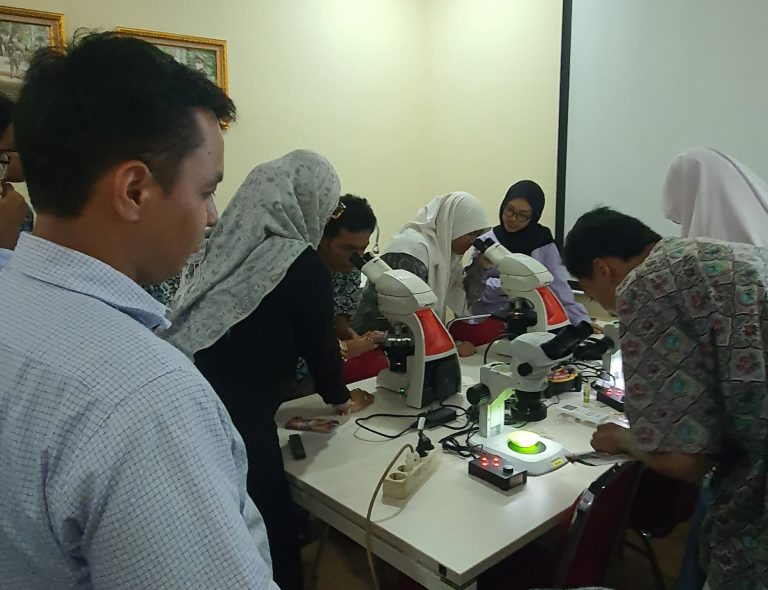|

The Department of Biology
Faculty of Mathematics and Natural Sciences Universitas Indonesia
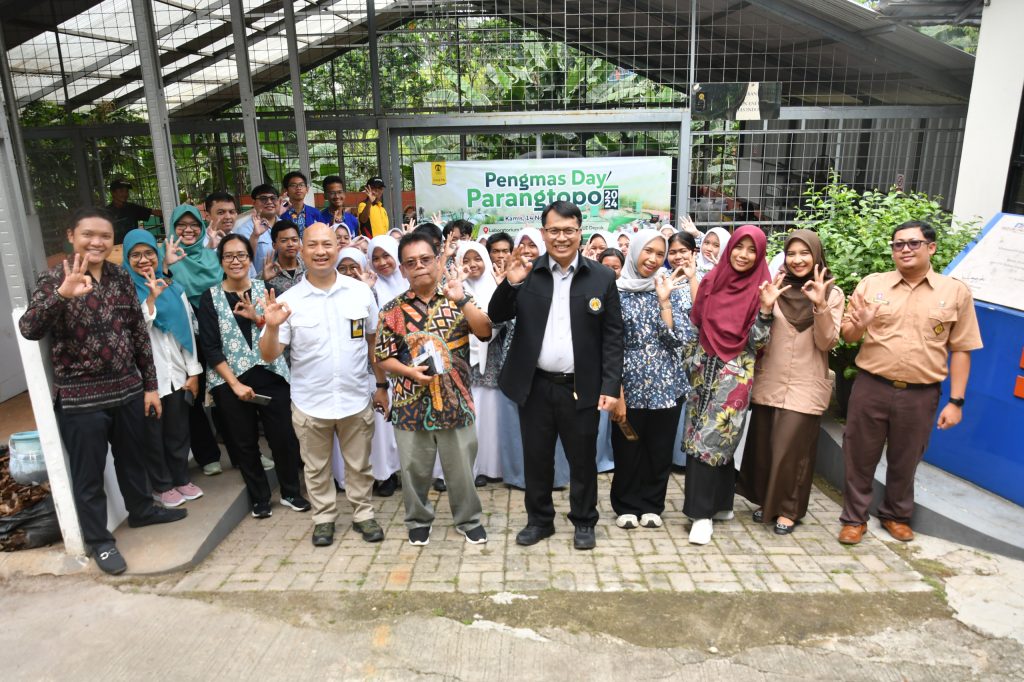
The Faculty of Mathematics and Natural Sciences (FMIPA) of the University of Indonesia (UI) held a Community Service activity entitled Pengmas Day on Thursday (11/14/2024) at the Parangtopo Laboratory Complex, FMIPA UI, UI Campus, Depok. This activity was organized by the Research and Community Service Unit (PPM), in collaboration with the Department of Biology and the Geology Study Program, and was attended by 25 students from three senior high schools (SMA) in Depok. Participants consisted of 14 students and 2 teachers from SMAN 2, 6 students and 1 teacher from SMAN 7, and 5 students and 1 teacher from SMAN 12.
The Dean of FMIPA UI, Prof. Dede Djuhana, Ph.D., in his remarks expressed the importance of environmental education, especially related to waste management, understanding rocks, and biodiversity as an effort to understand the environment. According to him, in the midst of increasingly complex environmental problems, this knowledge is very important to be instilled in the younger generation.
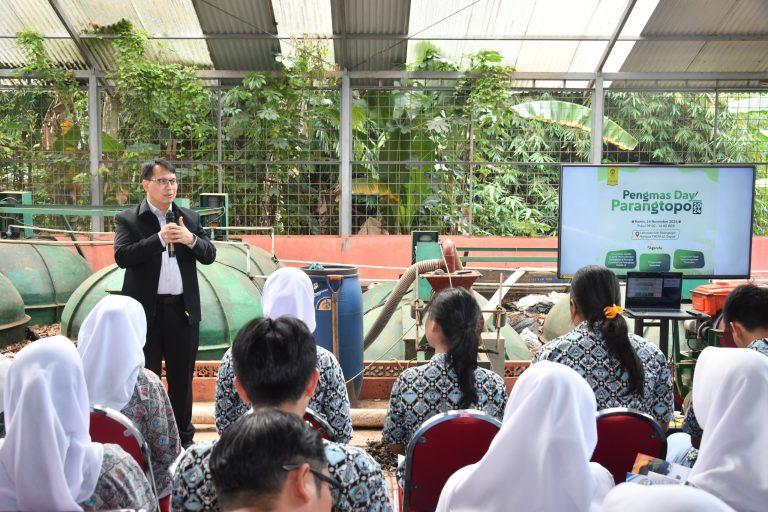
“FMIPA UI is committed to continuously developing science and being responsible in disseminating it. Through this Community Service activity, we not only share knowledge, but also encourage students to become agents of change in maintaining environmental balance,” said Prof. Dede.
Furthermore, Prof. Dede explained that waste management, understanding of rocks, and plant biodiversity are interrelated in maintaining the ecosystem and the sustainability of human life. These three aspects, although they seem separate, have a mutually supportive role in creating a healthy and sustainable environment.
“A healthy environment supports economic growth, health, and human welfare. Hopefully you can utilize the knowledge gained in the Parangtopo FMIPA UI natural laboratory for the good of the environment,” he added to the participants.
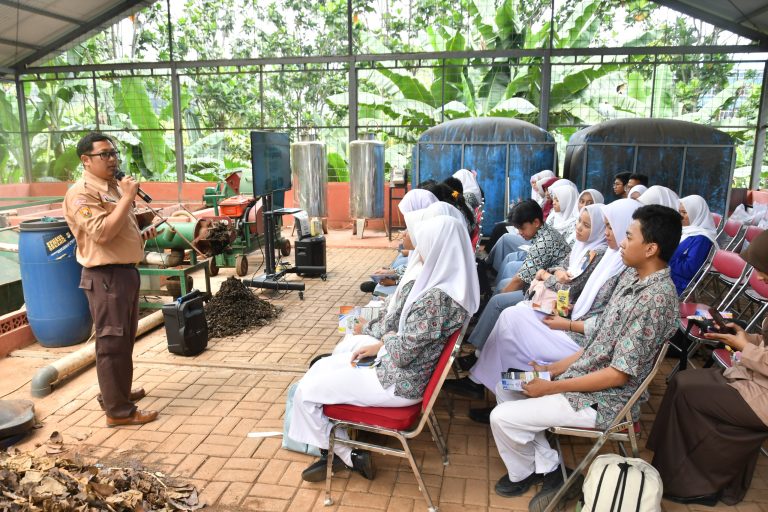
Meanwhile, Ridho Wibowo, M.Pd., representing the school, expressed his appreciation for the opportunity given to his students to participate in this activity. According to Ridho, this activity provides valuable experience outside the classroom, especially regarding biodigester technology for processing waste into solid and liquid nutrients and electrical energy that is not yet available in their school.
"We are very grateful to the FMIPA UI team for inviting us. This biodigester technology is very useful, considering that in our school, we still use manual methods to manage organic waste. In addition, studying rocks and plants directly is also very interesting for students," said Ridho.
He hopes that this activity will not only provide knowledge, but also build awareness and change habits in everyday life. Ridho hopes that students can be role models in waste management and protecting the environment in the community, starting from their own school environment.
The community service team led by Dr. Dipo Aldila, S.Si., M.Si., as the Manager of PPM FMIPA UI, together with Dr. Windri Handayani, S.Si., M.Si. and Afiatry Putrika, M.Si. (Lecturers of the Department of Biology), Twin Hosea Widodo Kristyanto, S.T., M.T., and Aldo Febriansyah Putra, M.T. (Lecturers of the Geology Study Program), then provided materials related to the topics discussed in the activity.
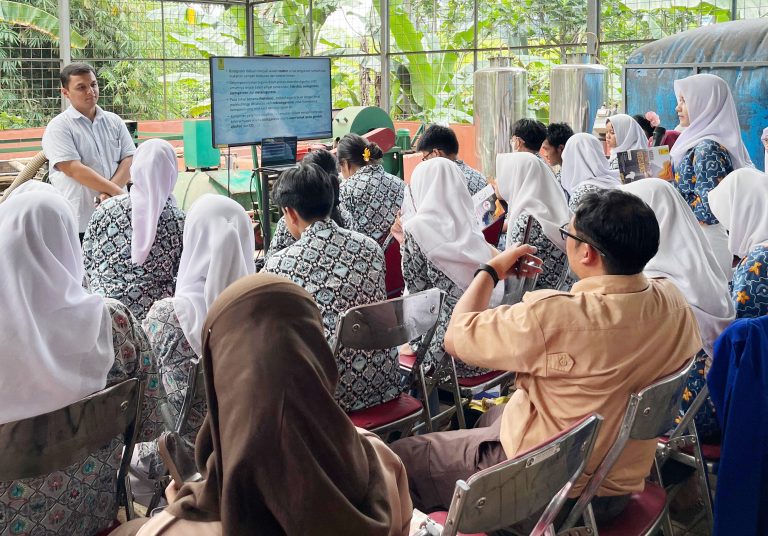
The first presentation in the Parangtopo Day Community Service activity was delivered by Dr. Dipo Aldila, S.Si., M.Si., and Aldo Febriansyah Putra, M.T., regarding Education on Organic Waste Processing Using Biodigesters. Both speakers explained the concept of biodigesters which are used to process leaf waste and food waste into compost and methane gas.
"The compost making process in the Parangtopo Laboratory, FMIPA UI, uses Fixed Dome Digester Compose technology anaerobically. Based on the study conducted, the best ratio between organic waste, dry leaf waste, and animal waste is 5:5:2," explained Dr. Dipo.
In addition, Dr. Dipo added that the biodigester machine not only produces nutritious organic solid and liquid fertilizers, but also functions as a PLTSa (Waste Power Plant) which can be used as driving energy for the biodigester machine itself.
After the presentation on biodigesters, the event continued with an educational session on the basics of plant diversity. This session is designed to provide hands-on learning experiences in the field, getting to know the habitus and way of life of plants in an interactive and fun way.
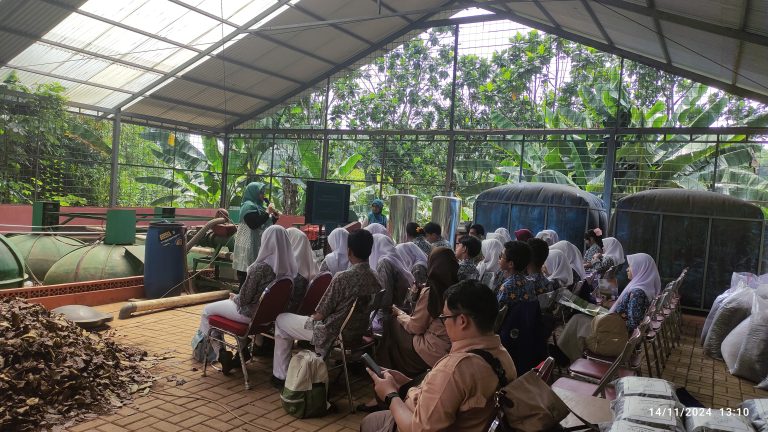
As a practical guide, a team from the Department of Biology, FMIPA UI, created an illustrated booklet. The booklet, compiled by Dr. Windri Handayani and Afiatry Putrika, M.Sc., contains important information about habitus (plant form) and how they live. With an attractive and easy-to-understand visual design, this booklet is a learning tool for students during plant exploration around the Parangtopo Laboratory.
This booklet not only contains theory, but also connects the knowledge learned in class with facts in the field. One of the activities that most attracts students' attention is an interactive game that introduces them to the habitus and how plants live. In this game, students are asked to match the information in the booklet with the plants they encounter. They must be able to recognize the types of plants, such as herbs, shrubs, trees, as well as examples of epiphytic plants that live attached to other tree trunks, or identify parasitic plants that do not have chlorophyll.
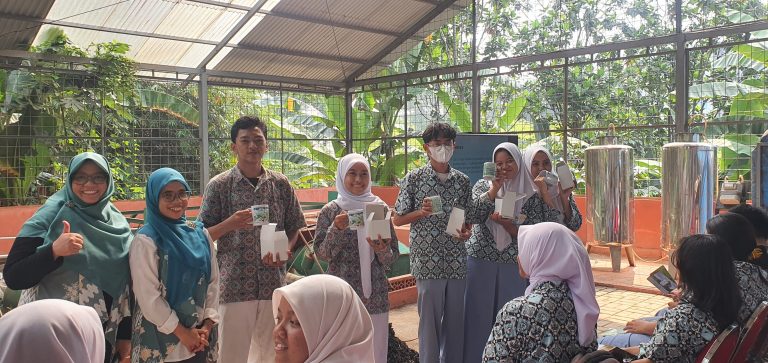
The students' enthusiasm increased during the question and answer session. Many students were curious about unique plants, such as parasitic plants that do not have chlorophyll. One of the questions often asked was, "Can parasitic plants still photosynthesize?" The FMIPA UI Biology Department Team explained that parasitic plants, such as Rafflesia (padma flower) and ghost orchids, get nutrients directly from their hosts, because they do not have leaves and chlorophyll.
These questions showed the high level of students' curiosity about how plants live, especially those with unique adaptations. This activity provides a different learning experience, inviting students not only to get to know the diversity of plants but also to understand the ecological relationships that occur in nature. Through a practical and interactive approach, students become closer to the world of biology, especially plants, and increasingly understand the importance of preserving biodiversity
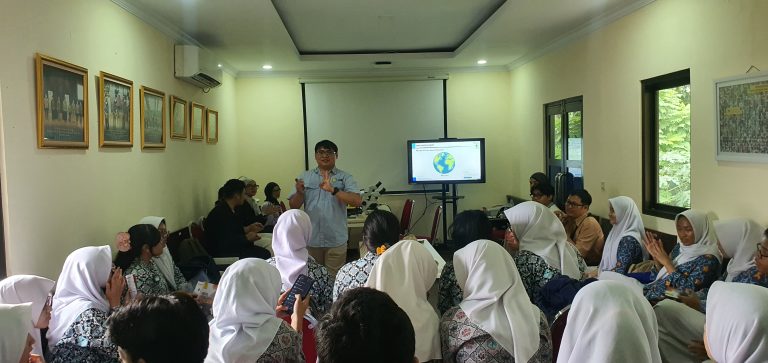
The Community Service Day activity continued with a visit to the Geology Laboratory, where participants listened to a presentation on geoscience education delivered by Twin Hosea Widodo Kristyanto, S.T., M.T. This material aims to introduce the unique geological conditions of Indonesia, as well as its implications for the potential of natural resources and disaster risks. In addition, students are also introduced to the scope of geoscience and its relevance to basic disciplines such as physics, chemistry, and biology, which are the foundation of learning at FMIPA UI.
As part of the activity, students are given practical experience through a rock analysis session. They learn to use a polarizing microscope to view thin sections of rocks and a stereo microscope to observe micro fossils. This activity not only provides theoretical insight, but also direct experience that strengthens their understanding of geological processes.
